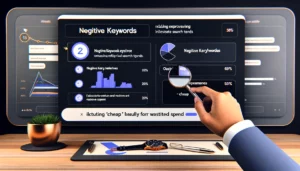Maximise Your UK Market Reach: Cost-Effective Google Ads PPC Strategies

Stretch Your PPC Budget Further in the UK Market with Google Ads PPC strategies from the best in the business!
Running a successful Google Ads PPC campaign in the UK doesn’t have to break the bank. Savvy marketers can achieve impressive results while keeping a watchful eye on their budget. Here, we’ll explore key Google Ads PPC strategies specifically designed to help UK advertisers get the most out of their PPC spend. From keyword magic to laser-focused targeting, we’ll equip you with the tools to make your Google Ads PPC campaigns cost-effective and conversion-driven.
Key Takeaways for “Google Ads PPC Strategies”
- Effective keyword research is crucial for identifying high-value and localised terms that resonate with the UK market.
- Crafting compelling ad copy with attention-grabbing headlines and strong calls to action can significantly boost your campaign’s performance.
- Organising your campaign structure, including ad groups and conversion tracking, ensures efficient management and better results.
- Leveraging advanced targeting options, such as geo-targeting and remarketing lists, helps reach the most relevant audience segments.
- Regularly analysing and refining your campaign performance through A/B testing and data interpretation is essential for continuous improvement.
Effective Keyword Research for the UK Market
Identifying High-Value Keywords (Google Ads PPC strategies)
To maximise your reach in the UK market, start by identifying high-value keywords that resonate with your target audience. Understanding the cultural nuances and preferences of the UK audience is crucial. Use tools like Google Keyword Planner and Ubersuggest to find keywords with high search volume and low competition. This will help you get the most out of your budget.
Utilising Long-Tail Keywords
Long-tail keywords are essential for a cost-effective PPC strategy. These keywords are more specific and often less competitive, making them cheaper and more effective. For example, instead of targeting “plumber,” you might target “emergency plumber in London.” This not only reduces costs but also increases the likelihood of conversions.
Incorporating Localised Terms
Incorporating localised terms can significantly improve your ad relevance and performance. Use terms that are specific to UK regions or cities, such as “London PPC agency.” This helps in attracting a more targeted audience. Additionally, localised terms can improve your Quality Score, leading to lower costs per click and better ad placements.
Remember, effective keyword research is the foundation of a successful PPC campaign. Take the time to understand your audience and choose your keywords wisely.
Crafting Compelling Ad Copy
Writing Attention-Grabbing Headlines
Your headline is the first thing potential customers see, so it needs to be captivating. Use powerful keywords that align with the user’s search intent. A well-crafted headline can significantly improve your click-through rate (CTR). For instance, if you’re a PPC ad agency, your headline could be something like, “Boost Your Sales with Expert Google Ads PPC Management.” This immediately tells the user what they can expect and why they should click.
Highlighting Unique Selling Points
Your ad copy should clearly communicate what sets your product or service apart. Highlight the unique benefits and features that make your offering superior. For example, if you’re a PPC eCommerce agency, emphasise your expertise in driving online sales and your proven track record. Use bullet points to make these points stand out:
- Proven ROI with tailored PPC strategies
- Expertise in Google Adwords PPC campaigns
- Dedicated account management for personalised service
Using Strong Calls to Action
A compelling call to action (CTA) is crucial for converting clicks into customers. Your CTA should be clear, direct, and action-oriented. Phrases like “Get Started Now,” “Claim Your Free Consultation,” or “Boost Your Traffic Today” can be very effective. Make sure your CTA aligns with the user’s intent and the overall goal of your campaign.
Remember, every element of your ad copy should be meticulously tested and refined to ensure maximum effectiveness. Tailored ad copies not only increase the likelihood of clicks but also improve your Quality Score, reducing your Cost Per Click (CPC).
Optimising Campaign Structure
Organising Ad Groups Effectively
To maximise the efficiency of your Google Ads campaigns, it’s crucial to organise your ad groups effectively. Consider segmenting your campaigns based on geography, products, or services. For instance, if you’re a locksmith operating in London, Birmingham, and Manchester, you might create separate campaigns for each location. Within these campaigns, you can have ad groups targeting different keywords. This approach ensures that your ads are highly relevant to the search queries, improving your Quality Score and overall performance.
Setting Up Conversion Tracking
Conversion tracking is essential for measuring the success of your PPC campaigns. By setting up conversion tracking, you can monitor which ads and keywords are driving valuable actions on your website, such as purchases or sign-ups. This data allows you to make informed decisions about where to allocate your budget for maximum ROI. Without conversion tracking, you’re essentially flying blind. Make sure to set up conversion tracking through Google Ads or Google Analytics to gain insights into your campaign performance.
Implementing Negative Keywords
Negative keywords are a powerful tool to refine your targeting and ensure your ads are shown to the most relevant audience. By adding negative keywords, you can exclude search terms that are not relevant to your business, thereby reducing wasted spend. For example, if you sell luxury watches, you might add “cheap” as a negative keyword to avoid showing your ads to users looking for budget options. Regularly review and update your negative keyword list to keep your campaigns optimised and cost-effective.
Implementing a well-structured campaign not only improves your ad relevance but also enhances your ability to measure and optimise performance effectively.
Google Ads PPC Strategies: Leveraging Advanced Targeting Options
Geo-Targeting for UK Regions
Geo-targeting allows you to focus your marketing efforts on specific geographic areas within the UK, ensuring your ads reach the most relevant audience. By concentrating on regions where there is a high demand for your services, you can significantly increase your chances of connecting with interested customers. This approach not only helps in building brand recognition within the community but also proves to be cost-effective, driving more qualified leads to your business.
Demographic Targeting Strategies
Demographic targeting enables you to tailor your ads based on specific characteristics such as age, gender, and household income. This level of precision ensures that your ads are shown to the most relevant audience, thereby increasing the likelihood of conversions. For instance, if your eCommerce PPC campaign targets young adults, you can adjust your settings to focus on this age group, optimising your ad spend and improving overall performance.
Utilising Remarketing Lists
Remarketing lists allow you to re-engage users who have previously interacted with your website or app. By targeting these users with tailored ads, you can encourage them to return and complete a desired action, such as making a purchase or filling out a form. Implementing this tactic is a smart move to optimise your ad spend and improve the overall performance of your campaigns. Additionally, you can create different remarketing lists based on user behaviour, ensuring that your ads are highly relevant and personalised.
Maximising Quality Score (Google Ads PPC strategies)
To truly excel in your Google Ads campaigns, understanding and maximising your Quality Score is essential. Higher Quality Scores generally lead to lower costs-per-click (CPC), giving you more value for every pound spent. Additionally, high-quality scores contribute positively towards improving your Ad Rank in search results, making your ads more visible without inflating your budget.
Analysing and Refining Campaign Performance
Conducting A/B Testing
A/B testing is a powerful method to determine which elements of your ads are most effective. By comparing two versions of an ad, you can identify which one performs better in terms of clicks and conversions. This process helps you make data-driven decisions to optimise your campaigns. Regular A/B testing can significantly enhance your PPC performance.
Interpreting Performance Metrics
Understanding and interpreting performance metrics is crucial for refining your campaigns. Key metrics to monitor include CTR (click-through rate), CPC (cost per click), and conversion rates. These indicators provide insights into how well your ads are performing and where improvements are needed. Google advertising agencies often use these metrics to adjust strategies and improve ROI.
Adjusting Bids Based on Data
Bid adjustments are essential for maximising the efficiency of your PPC campaigns. By analysing data, you can determine which keywords and ads are driving the most conversions and allocate your budget accordingly. This ensures that you are not overspending on underperforming keywords. A thorough PPC audit can help identify areas where bid adjustments are needed.
Regular analysis and refinement of your PPC campaigns are vital for sustained success. Partnering with a professional PPC agency can provide the expertise needed to navigate complex data and implement effective strategies.
In summary, continuous monitoring and optimisation are key to achieving the best results from your Google Ads campaigns. Whether you are working with Google ads agencies or managing your campaigns in-house, these practices will help you stay ahead in the competitive UK market.
Conclusion f0r Google Ads Pay Per Click Strategies
Maximising your reach in the UK market through cost-effective Google Ads PPC strategies is not only achievable but also essential for staying competitive. By leveraging targeted keywords, optimising ad copy, and continuously refining your campaigns through A/B testing and data analysis, you can ensure that every pound spent contributes to your business’s growth. Remember, the key to success lies in strategic planning and execution, rather than simply increasing your budget. With the insights and strategies discussed, you’re now equipped to make informed decisions that will drive conversions and maximise your return on investment. Stay proactive, keep learning, and watch your UK market presence flourish.
Frequently Asked Questions
What is PPC and how does it work?
PPC stands for Pay-Per-Click, a digital advertising model where advertisers pay a fee each time their ad is clicked. It’s a way of buying visits to your site, rather than attempting to earn those visits organically.
Why is keyword research important for Google Ads PPC campaigns?
Keyword research is crucial because it helps you identify the terms potential customers are using to search for products or services like yours. This ensures your ads appear in relevant search results, increasing the chances of attracting the right audience.
How can I make my Google Ads more cost-effective?
To make your Google Ads more cost-effective, focus on effective keyword research, create compelling ad copy, optimise your campaign structure, leverage advanced targeting options, and continuously analyse and refine your campaign performance.
What are long-tail keywords and why should I use them?
Long-tail keywords are longer and more specific keyword phrases that visitors are more likely to use when they’re closer to making a purchase. They are less competitive and often cheaper, making them a cost-effective option for PPC campaigns.
How does geo-targeting benefit my Google Ads PPC strategies & campaigns in the UK?
Geo-targeting allows you to focus your ads on specific geographic areas, ensuring that your ads are seen by people in locations relevant to your business. This can improve the effectiveness of your campaigns and reduce wasted spend.
What is a Quality Score and why is it important?
Quality Score is a metric used by Google to measure the relevance and quality of your keywords and PPC ads. A higher Quality Score can lead to lower costs and better ad positions, making it a critical factor in the success of your campaigns.
Author
Search Blog
Free PPC Audit
Subscribe to our Newsletter
The Voices of Our Success: Your Words, Our Pride
Don't just take our word for it. With over 100+ five-star reviews, we let our work-and our satisfied clients-speak for us.
"We have been working with PPC Geeks for around 6 months and have found Mark and the team to be very impressive. Having worked with a few companies in this and similar sectors, I rate PPC Geeks as the strongest I have come across. They have taken time to understand our business, our market and competitors and supported us to devise a strategy to generate business. I value the expertise Mark and his team provide and trust them to make the best recommendations for the long-term."
~ Just Go, Alasdair Anderson




